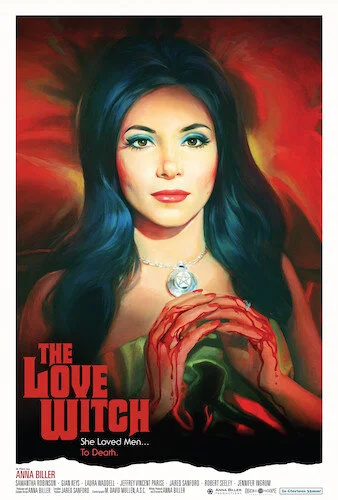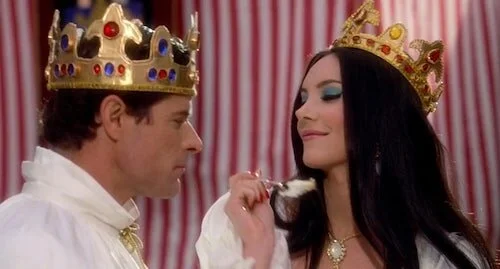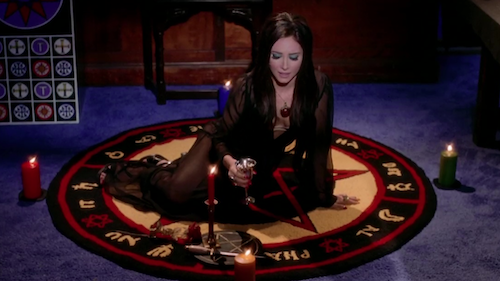The Love Witch: 31 Days of Horror
For all of October, we will review horror films. Submit your requests here, and you may see your picks selected!
I do have a bit of a problem with a lot of horror comedy films, mainly because they feel extremely over the top. Even though there is a common ground with both sides of the genre (laughing and screaming are both reactionary responses to the unexpected), I feel like films of this niche category are given the go-ahead to be too silly to be scary, or too strange to land jokes. It’s a cult territory I don’t find myself being too in love with, although there are some strong exceptions. House is absurd to the point of being impossible to describe. The Evil Dead 2 feels like the perfect midnight flick that tells all of its own jokes before you can jeer. Then, there’s Anna Biller’s The Love Witch, which subverts both its horror and comedy elements to become a strange amalgamation, as if it were its own new genre.
As a ‘60s homage, The Love Witch is extremely faithful, with Technicolor-like hues and the types of framing you would find sixty years ago (something many faux-retro films forget to take into consideration). The sound even feels like it is closer to that time period than our own. You can still tell it’s a film of the 2010’s, but The Love Witch is authentically nostalgic enough to lure you into its yesteryear spell enough times. At the same time, it mocks itself for being a product of a different time, inviting all of the era’s campiness in full force; one of my favourite moments is a punch that’d dumbed-down by an angle that gives away the illusion of an actual hit, and the Foley sound that is obviously stock. In the universe of the film and the time period it came from, this is a serious moment, so it’s still serious for the film. For us, it’s an extra layer of cheese that we’ve willingly accepted ages ago.
Elaine and Griff celebrating.
At the heart of Biller’s story is feminist commentary, and the use of a different time period is a statement on the unfortunate timelessness of the male gaze and patriarchal favouritism. Witches have been appropriated in our lifetime as astrology fanatics that shop at Urban Outfitters and listen to Lana Del Rey (who herself has “taken part in” Wiccan ceremonies online [we can’t say for sure]), so this side of the story is shown in The Love Witch too; witch Elaine is both a spell conjurer and a fashionable lady looking for love. Enough of Elaine’s predicament is dictated by powers that aren’t her own, especially from men that either break her heart, or force her to be objectified or a commodity (including in the witch group she is now a part of). At the same time, Biller celebrates women in the same shots, including burlesque performances, musical numbers, and other highlights. Biller wants women to be heard on all fronts, even in this satirical setting.
Elaine is played by then-newcomer Samantha Robinson, who encapsulates the film’s playful charm perfectly. She is knowingly a ‘60s character, embodying all of that era’s schmaltz, but Robinson knows there is a truth and a heart in the films of that time period as well. With complete awareness, Robinson handles the title character and creates not an archetype but a tribute, whilst still carrying her own palette of emotions and inner thoughts. It’s this kind of validity that The Love Witch possesses throughout: as fun as it is, it also never forgets its main objective in conveying an important glance at the female experience. This allows the film to get more out-there, with certain spells and outcomes that may seem to come out of nowhere for a satire; in reality, all of this is completely in line with what The Love Witch was always fulfilling.
Elaine conjuring up a spell.
I may only consider The Love Witch scary as a social statement, with how far people are willing to go for their own selfish desires, in a misogynistic world that has women competing with each other to appease the same men that sexualize them and treat them as nonhumans. The Love Witch also shows male allies, so it isn’t one sided by any stretch of the imagination. The main thing is the gore and frighting imagery only elevates the commentary more than the film’s own sense of horror, which isn’t a problem at all, considering that The Love Witch is of its own unique style anyway.
In conclusion, Biller is always cognizant of what she can illustrate in the unique combination of comedy and horror, by showcasing that toxic masculinity is not a riot, and the uphill battle women face is damaging to all. The Love Witch is of its own world, but, considering the similar predicaments women are placed in where they have to face themselves as men watch from afar, it’s very much of our world too. Maybe some of the men that fall victim to Elaine’s spells are innocent, but they’re also the sacrifices of a painfully misogynistic world. There is no single definitive claim, either; Biller allows her Technicolor playground to have your minds thinking about the film, and our current situations on the matter.
Andreas Babiolakis has a Masters degree in Film and Photography Preservation and Collections Management from Ryerson University, as well as a Bachelors degree in Cinema Studies from York University. His favourite times of year are the Criterion Collection flash sales and the annual Toronto International Film Festival.








